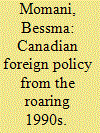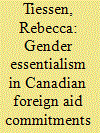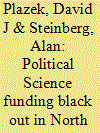|
|
|
Sort Order |
|
|
|
Items / Page
|
|
|
|
|
|
|
| Srl | Item |
| 1 |
ID:
154637


|
|
|
|
|
| Summary/Abstract |
As a field of study, Canadian Foreign Policy has undergone dramatic changes over the last three decades, becoming disconnected from debates about our identity and values and more focused on Canadian foreign and defence policy. This transition in Canadian Foreign Policy reflects the changing priorities of successive Canadian governments and structural shifts in Canadian academia. Yet, such change has unfolded gradually and incrementally, such that key challenges remain for scholars interested in working, presenting, and publishing in Canadian Foreign Policy. Using my own experiences as a student and teacher of foreign policy in Canada, I reflect on these transformations within Canadian Foreign Policy and their implications, beginning with the “golden age” of Canadian Foreign Policy during the 1990s to its decline under the Harper government and, finally, to our current climate of fragmented academic and professional research. In the current climate, participating in traditional and “new” social media places professional incentives (namely, tenure and promotion via peer-reviewed outlets) in tension with emerging opportunities to engage in more open critical analysis of Canadian Foreign Policy.
|
|
|
|
|
|
|
|
|
|
|
|
|
|
|
|
| 2 |
ID:
137164


|
|
|
|
|
| Summary/Abstract |
Canada has made a wide range of commitments to the promotion of gender equality in development assistance programming. However, in its fragile states programs, these commitments have in fact promoted gender essentialism, treating women as victims of violence rather than as active agents of peace and development. Drawing on a comparative analysis of the National Action Plan on Women, Peace and Security arising from the passing of Security Council Resolution 1325 (2000) and on interviews conducted with a small sample of current and former Canadian government officials, this article documents and analyzes Canada’s comparatively weak and limited efforts to promote gender equality abroad under the Harper Conservatives, particularly for fragile and conflict-affected states. The research presented here is situated within broader feminist critiques of international relations and Canadian foreign policy, which document the centrality of gender equality to security and the role that international and national policies play in shaping gendered security dynamics.
|
|
|
|
|
|
|
|
|
|
|
|
|
|
|
|
| 3 |
ID:
126351


|
|
|
|
|
| Publication |
2013.
|
| Summary/Abstract |
Recent actions in Congress that threaten political science funding by the National Science Foundation (NSF) have caught the attention of political scientists, but this was not the first attack and not likely to be the last. Less than one year ago, the Harper government ended the Understanding Canada program, an important source of funding for academics in the United States and abroad. This article stresses the value of the program and the importance of this funding steam by demonstrating what the grants have done both more generally as well as for the authors individually. In addition, by looking at the political process that led to the end of the Understanding Canada program and the similarities in the attacks on NSF political science funding, this article identifies potential reasons why these funds were and are at risk. We conclude by arguing that normative action in support of political science is a necessity for all political scientists.
|
|
|
|
|
|
|
|
|
|
|
|
|
|
|
|
|
|
|
|
|